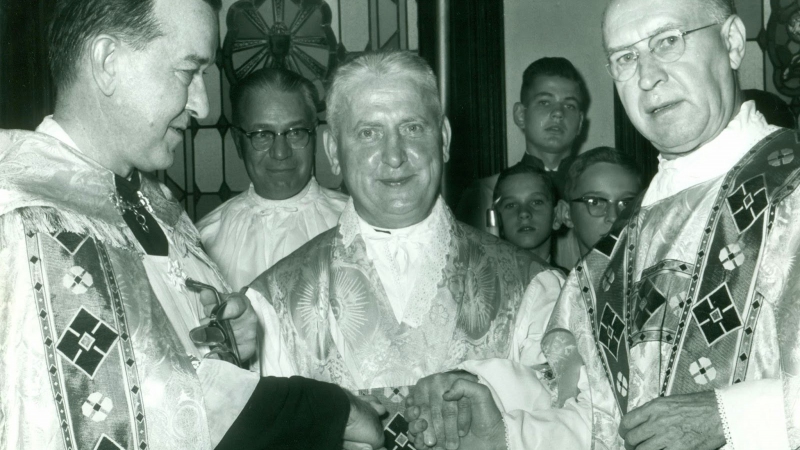The Holy Mass Gave Us Strength – Fr. Walter Ciszek in Russia
April 12, 2023 | Fr. Patrick Wainwright, MC

The Mass Gave Us Strength
Fr. Walter Ciszek was born in Shenandoah, PA, in 1904, and died in 1984.
He felt called to the priesthood, so he entered the Society of Jesus, better known as the “Jesuits”.
Soon after, in 1929, Pope Pius XI made a call addressed to seminarians, to volunteer to prepare themselves to eventually go as missionaries to Russia. Just to give you a bit of context, World War One ended in 1918. The Soviet Communist revolution in Russia took place in 1917. This Revolution overthrew the Czar and established a Communist regime instead.
Fr. Ciszek volunteered to be a missionary in Russia—he had great hopes, great dreams of bringing the Gospel to so many people eager to embrace the Lord.
He was ordained in 1937. By then, it was impossible to enter Russia, as the Communist regime had forbidden all priests from entering.
So he was sent to Albertyn, a town in Poland. But then, in 1939, World War II began. The Nazis invaded Poland from the west, and then the Soviets invaded Poland from the East, and actually took over the town of Albertyn, where Fr. Ciszek was. He had not been able to go to Russia… but Russia had come to him.
However, the mission church where Fr. Ciszek was was closed. So, after much deliberation, he and another priest, decided to go to Russia as refugee workers, and see if they could eventually minister to the people.
However, the conditions of their trip to Russia were quite miserable. Entire families were stacked in a train car, with just a slop bucket for a bathroom and an oil can for a stove. And when they arrived to their destination to work, the poverty was extreme. They had to work very hard for a very low pay. They had to stack heavy logs of lumber. With what they earned in a day, Fr. Ciszek and his brother priest were able to buy a loaf of rye bread, and sometimes not even that.
To make matters worse, nobody wanted to talk about their faith, because not only was it illegal, but people could report anyone trying to spread the faith to the KGB, and they would be arrested. As a conclusion, they realized they could do nothing to share the Gospel… All their efforts had been for nothing, at least it seemed that way…
As their realization grew, the sadness and despondency in their spirits grew worse. They started to think that all their hopes of evangelizing Russia had been but a pipe dream. They thought of going back to Poland, where they at least could do some good to the Polish people they knew. Their hearts sunk in a profound depression of spirit.
In all this the only support for Fr. Nestrov and Fr. Ciszek was the celebration of the Holy Mass. This is how Fr. Ciszek put it:
“Our one spiritual consolation was the Mass. Occasionally, we were able to get away, just the two of us, into the forest and there celebrate a Mass in secret. We wore no vestments, the stump of a tree served as our altar, and we had to be constantly on guard against discovery… The Mass gave us strength. (…) It was amazing how impressive the Gospel message could be in such circumstances; our spirits would seem to drink in the words, savor them, and feel the divine power in them. And at the moment of Consecration, God became present in a new way in Teplaya-Gora. He was there, in answer to our petitions, where the sacrifice of Calvary had never been celebrated before. In that sacrament we could offer up all our sacrifices with His, could ask his blessing on those for whom we labored and prayed in secret (…). Those were my most consoling thoughts, my happiest moments (…). The consolation of that sacrifice, that offering, would stay with me as we returned home through the darkness and silence of the forest.”
This is how they were able to persevere in the midst of a deeply disappointing and hopeless reality. This is how they kept on going, and eventually, after many years and sufferings, Fr. Ciszek would finally be able to minister to so many Catholics in Communist Russia, in spite of being apprehended and living in a partial freedom.
After some 23 years of imprisonment, Fr. Ciszek was released from the Soviet Union and returned to the United States in October 12, 1963 (he was exchanged for a Soviet agent detained in the US), where he continued his mission as a priest and spiritual director of many people.
What was there in the Mass that gave him strength? THE HOLY MASS is the very same Sacrifice of Christ in Calvary, made present in a mystical, sacramental way on the altar of the Mass through the action of the Catholic Priest. It makes Christ really, physically present on the altar. This presence gives you interior strength, it gives you the grace of God to do what otherwise would be very hard or almost impossible to do, and it makes you grow in the love of God.
This is why you should attend Mass and receive our Lord in the Blessed Sacrament frequently. By “frequently,” I mean not only every Sunday (which you have the obligation to do), but even during weekdays, when it’s not “obligatory”. That will give you the strength to live your life in a virtuous, holy way.
